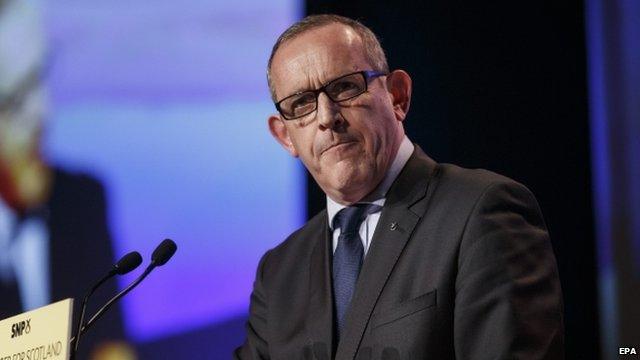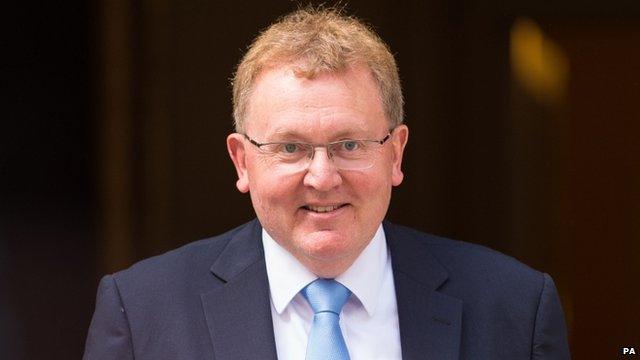Taking a theological approach
- Published

Could politicians of today be drawing upon the philosophical approach of theologians of the past?
While at university in Fife, I took the opportunity, briefly, to study theology. I had absolutely no intention of becoming a minister. It was but a whim, a youthful fancy, which sat alongside my wider interest in philosophy.
Nevertheless, I thoroughly enjoyed the year-long course, delivered by excellent lecturers whose oratorical skills had been honed in the pulpit.
We studied Anselm, Abelard, Aquinas and several other theologians further down the alphabet. It was, genuinely, fascinating: a useful backdrop to scrutinising the likes of Descartes who sought to provide continuing relevance for theological thought and David Hume who, adamantly if elegantly, did not.

Where to watch
Follow live coverage of the second reading of the Scotland Bill in the House of Commons, starting at 15:30.

There are many sayings from these theological writers which have persisted. But perhaps the most droll was delivered by Augustine of Hippo who notes in his Confessions that it was his wont, while a youth, to pray to be made chaste and pure - but not yet.
Something of the Augustinian spirit would appear to be abroad in contemporary Scottish political discourse. It would appear to have impacted upon the SNP and, in a different way, their Unionist opponents.
No, no, not the absence of purity. Never, dear reader, never. Rather I refer to the interest in procrastination.
Today MPs are affording a second reading to the Scotland Bill which gives legislative consent to the proposals in the Smith Commission for more powers to be devolved to Holyrood.
The SNP's MPs, all 56 of them, are making plain that they are discontented with the Bill. They have two fundamental objections.
One, they argue that the wording of the legislation fails to deliver the terms of the Smith proposals. They insist that the text involves the maintenance of a veto for the UK government in respect of key aspects. UK ministers counter this, arguing that the plan involves sensible inter-governmental consultation.
Two, the SNP want to go further than Smith. That was then, this is now, they argue. Scotland has plainly, palpably, voted for further powers to be transferred.
These, they suggest in an amendment to today's second reading motion, should involve such matters as "job creation, taxation, welfare and wages".
Today's debate, of course, is a discussion about the Bill in principle with an encompassing vote at the end. It is the equivalent of a Stage One Debate at Holyrood following initial committee scrutiny.
In the Commons, after second reading, the Bill will go to line by line scrutiny next week although, as a constitutional bill, this will be taken on the floor of the House and not upstairs in Committee.

SNP Deputy Leader Stewart Hosie argued that Scotland would thrive with full control of tax and spending

David Mundell will be in the House of Commons for the second reading of the Scotland Bill
At this scrutiny stage, it will be open to MPs to table precise amendments to the legislation. At that point, presumably, SNP members will seek to insert precise provisions to implement their general suggestions today.
But look further at today's amendment. It notes that the demands tabled today are "early priorities as Scotland moves to a position in the medium term where the Scottish Parliament and government are responsible for all revenue raising".
But why the caution? Why not push, without peradventure, for full fiscal autonomy (FFA) now? Why this need for an interim position?
Remember that in decades past the result just obtained by the SNP in a UK General Election would have been considered by the party as a mandate for independence. Not a referendum. Not interim powers. Not full fiscal autonomy. SNP leaders of yore, given such a result, would have been opening negotiations for independence.
So why the change in emphasis? Two reasons. One, Nicola Sturgeon's party obtained this remarkable result for the party on a platform which stressed that people were not voting for a referendum, let alone for independence. Such matters were off the table. The mandate sought was to strengthen Scotland's voice at Westminster.
Full control of tax
Therefore it is entirely honourable to pursue a gradual approach now. It is in keeping with the tone and substance of the election campaign.
Is there though another consideration - perhaps one which prompted the caution in the first place? Are the SNP looking at the immediate sums, the contemporary financial arithmetic, particularly in the light of the slump in the oil price?
I recall interviewing Stewart Hosie during the SNP conference in Glasgow, just prior to the election. Mr Hosie argued that Scotland would thrive with full control of tax and spending. Economic policy would be better tailored to Scotland's needs.
But, when pressed, he agreed that the prevailing economic circumstances, given the situation in the North Sea, might be challenging. To be absolutely clear, he was not in any way resiling from an independence offer. His diagnosis of the economic challenge included problems created, as he would put it, on the UK's watch.
Nevertheless, it has become customary among SNP leaders to posit FFA as some way off, as a medium term proposal, as requiring the passage of years prior to implementation.
Next election
Naturally, their opponents have caught this tone - and have responded. The Davids, Cameron and Mundell, have both challenged the SNP to "spell out what they mean" by FFA.
However, as I have noted previously, there is an Augustinian wariness about the UK government's approach too.
They have the votes in the Commons to drive through their proposals. They could declare "Go Union!" - and tell the SNP where to get off.
They will not - at least not in the short term, as the Bill begins its process of scrutiny. They can count their majority in the Commons but they are also acutely aware of the political arithmetic in Scotland. They know there is another election next year, for Holyrood.
Therefore concessions there will be - although perhaps more on the wording of existing proposals rather than substantive further powers.
Their aim? To make Scotland quiet. But not yet.